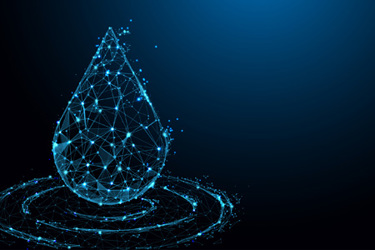An Integrated, Data-Driven Approach To Water Management
By Marco Achilea

Defining a sustainable digital strategy and employing solutions in a phased manner can result in multiple productivity, maintenance, reliability, and cost benefits for water utilities.
World Water Day on March 22nd once again highlighted the importance of fresh water and advocated for the sustainable management of resources. These are noble goals but often they are not yet matched by the requisite funding and investment, meaning water utilities must continue to do more with less.
Water operators in both advanced and developing economies face multiple challenges, among them plugging the gap between growing demand and almost stable supply, optimising performance and ageing infrastructure, reducing energy consumption and leaks, and ensuring compliance with laws aimed at reducing the impact of discharging effluents into the environment.
The proper application of digital technologies — everything from sensors, edge devices, and the Industrial Internet of Things (IIoT) to artificial intelligence (AI) or machine learning (ML) — can help the industry to meet these challenges by making smarter use of existing assets, increasing reusage of water while simultaneously releasing resources and replenishing water ecosystems.
Data generated from the field, for example, can be collected more frequently and analyzed to provide actionable insights and increase operational efficiency. Use cases show that improvements in productivity, maintenance, and reliability through digital solutions can easily extend beyond 15 percent.
Nor does digitalization have to mean a large CAPEX outlay. Data-driven solutions can be implemented stepwise and tailored to client’s specific challenges, and in some cases they can also redefine the traditional sector value chain with innovative business models.
Identify The Correct Sustainable Digital Solution
At the outset of any digitalization project, it is important to remember that successful solutions are a well-orchestrated mix of technology, processes, and people. Implementing technology ‘per se’ is not the final answer, as it may even complicate the operational framework and reduce the overall efficiency.
A sustainable digital solution is therefore one that is affordable, addresses the specific needs of each customer and evolves with them, and can be integrated safely and seamlessly into existing technology layers and data sources, whether they be intelligent devices or other legacy systems.
A survey of 267 companies by LNS Research revealed that the biggest challenge in deploying IIoT technology was funding (32 percent), closely followed by building a business case (30 percent) and understanding what IIoT is and how it applies to the business (26 percent). So, while having the appropriate high-standard technology available is a prerequisite, the ability of the solution to adapt to the specific needs or constraints of each case is a real gamechanger for utilities. Flexibility and adaptability are crucial.
ABB Genix, ABB Optimax, And Edge Devices
With this in mind, the first practical step towards digitalization in the water industry is ensuring that a reliable data collection system is in place and available. The ABB Ability™ Genix platform is the ‘backbone’ of the company’s suite of scalable digital solutions for water, collecting OT, IT, and ET data from both ABB and third-party systems. By combining AI, machine learning, and advanced analytics with deep domain knowledge, it delivers significant insights that can then be actioned to improve operational performance and help define more accurate strategic decisions.
Increasing numbers of water utilities are also looking to manage energy consumption autonomously. In Germany, for example, Kanalisations-Zweckverband’s treatment plant in Schwarzenbruck uses the ABB Ability™ Optimax® energy management solution to optimally couple onsite thermal, electric, and gas generation, storage, and consumption, leading to carbon neutrality and energy self-sufficiency.
Closing The Loop
What do we mean by closing the loop? On the one hand, it is about adopting a more sustainable, circular approach to future water usage. However, it is also about a closed-loop circuit rather than a one-way bottom up approach to data collection and analysis as it is today.
The next step in terms of digitalization, therefore, is a smart system that automatically adapts itself and responds based on changing conditions, combining the power of today’s data analysis tools with timely implementation in the field. In ABB’s view, this could be the missing piece that can really steer the water industry in the right direction in terms of closing the digital loop, bringing together people, technology, and the operational framework, back to the field where everything started.
Marco Achilea is head of water business at ABB Power & Water.
